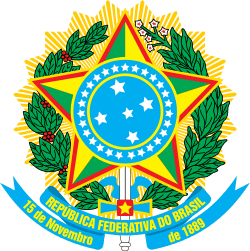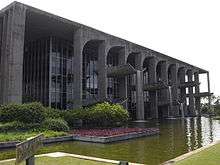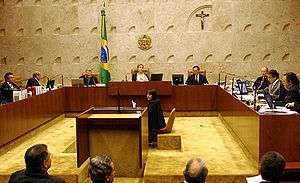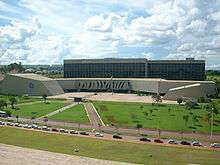Law of Brazil
 |
| This article is part of a series on the politics and government of Brazil |
|
| Foreign relations |
Brazilian law derives from Portuguese, French, Italian and German Civil law and is based on statutes and, partly and more recently, súmula vinculante (stare decisis). The Federal Constitution, in force since October 21st, 1988, is the supreme law of the country and is characterized by its rigid written form. The Constitution organizes the country as a Federative Republic, formed by the indissoluble union of the states and municipalities and of the Federal District. The 26 federate states have powers to adopt their own Constitutions and laws. Their autonomy, however, is limited by the principles established in the Federal Constitution.
Municipalities also enjoy restricted autonomy as their legislation must follow the dictates of the Constitution of the state to which they belong, and consequently to those of the Federal Constitution itself. As for the Federal District, it blends functions of federate states and of municipalities, and its equivalent to a constitution, named Organic Law, must also obey the terms of the Federal Constitution.
The powers of the Union, as defined within the Constitution, are the Executive, the Legislative and the Judiciary, which are independent and harmonious amongst themselves. The head of the Executive is the President of the Republic, which is both the Chief of State and the Head of Government and is directly elected by the citizens. The Legislative, embedded in the form of National Congress and consists of two houses: The Chamber of Deputies (lower house) and the Federal Senate (upper house), both constituted by representatives who are elected by the citizens. The Judicial powers are vested upon the Federal Supreme Court, the Superior Court of Justice, the Regional Federal Courts and Federal Judges. There are also specialized courts to deal with electoral, labor and military disputes.
The Judiciary is organized into federal and state branches. Municipalities do not have their own justice systems, and must, therefore, resort to state or federal justice systems, depending on the nature of the case. The judicial system consists of several courts. The apex is the Federal Supreme Court and is the guardian of the Constitution. Among other duties, it has exclusive jurisdiction to: (i) declare federal or state laws unconstitutional; (ii) order extradition requests from foreign States; and (iii) rule over cases decided in sole instance courts, where the challenged decision may violate the Constitution.
The Superior Court of Justice is responsible for upholding federal legislation and treaties. The five Regional Federal Courts, have constitutional jurisdiction on cases involving appeals towards the decision ruled by federal judges, and are also responsible for cases of national interest and crimes foreseen in international pacts, among other duties. The jurisdiction of the Federal Judges include: being responsible for hearing most disputes in which one of the parties is the Union (State); ruling on lawsuits between a foreign State or international organization and a municipality or a person residing in Brazil; and judging cases based on treaties or international agreements of the Union against a foreign State or international body.
State-level justice in Brazil consists of state courts and judges. The States of Brazil organize their own judicial systems, with court jurisdiction defined in each state constitution, observing that their legal scope is limited by those that do not concern the federal judicial ordainment. The legislative process begins, in broad terms, with a bill of law in one of the Congress Houses, either the Chamber of Deputies or the Federal Senate, thus called the Originating House. Once the bill is voted on, it can either be rejected or forwarded to the other house, which is called the Reviewing House. There the bill can be rejected, approved or amended to be then returned to the Originating House. Depending on the object of the bill, it is forwarded for the presidential sanction or veto, as a whole or in part. If the bill is vetoed, the members of the National Congress of Brazil can override such veto.[1]
Constitution and law

For centuries, as a Portuguese colony, the Law in Brazil was the Law of Portugal. Famous students of Brazilian colonial era, among them many revolutionaries, graduated from the important Portuguese University of Coimbra, located in Central Portugal. With the Independence of Brazil and the rise of the Empire, it was necessary to create a independent judiciary and also to give its staff a legal education in the country. In 1827, the first law schools in Brazil were founded: the Academies of Law and Social Sciences in São Paulo and Olinda.[2]
Brazilian law is largely derived from Portuguese civil law and is related to the Roman-Germanic legal tradition. This means that the legal system is based on statutes, although a recent constitutional reform (Amendment to the Constitution 45, passed in 2004) has introduced a mechanism similar to the stare decisis, called Súmula Vinculante. Nevertheless, according to article 103-A of the Brazilian Constitution, only the Supreme Court is allowed to publish binding rules.[3] Inferior judges and courts, and the public administration, are hence obliged to obey the interpretations of the Supreme Court.
In more recent times, according to the Judiciary Structure framed in the Brazilian Constitution, judicial power is divided between the State judicial branch and the Federal judicial branch, and they have different jurisdictions. The prerogatives and duties of judges are the same, the differences being only in the competences, structure and composition of the Courts.
Law and lawyers
In 2007, there were 1,024 courses of Law in Brazil, with 197,664 law students. The law schools are present in the all States of Brazil.[4] In the United States the number of law schools were only 180. The U.S. State of Alaska does not have a law school.[5] In 2010, the total of lawyers in Brazil were 621,885. The State of São Paulo had the largest number, 222,807 lawyers, one third of all working lawyers in the country. The State of Rio de Janeiro had 112,515 lawyers, and the State of Minas Gerais had 63,978 lawyers.[6]
The Course of Law is one of the most prestigious and promising in the country. With a duration of five years and at the end of the course the student becomes a graduate, can not yet exercise the profession. While studying in a law school, the student will have all the knowledge needed to pursue the many professions related to law school, but must first pass the examination[7] of the Bar Association of Brazil (Ordem dos Advogados do Brasil in Portuguese).[8]
The overall median income of the Brazilian lawyer was R$ 36,120 per year in 2007. The starting median income was R$ 20,040, and the top median was R$ 3,000,000. The Brazilian judge had an overall median income of R$ 170,000. The starting median income was R$ 150,500, and the top median was R$ 310,500. The Brazilian prosecutors had an overall median income of R$ 150,000. The starting median income was R$ 140,000, and the top median was R$ 270,000 per year.[9]
State-level judiciary

Trial courts
Each state territory is divided into judicial districts named comarcas, which are composed of one or more municipalities. The 27 Courts of Justice have their headquarters in the capital of each State and have jurisdiction only over their State territories. The Federal District only presents the federal-level judicial branch. Each comarca has at least one trial court, a court of first instance. Each court of first instance has a law judge and a substitute judge. The judge decides alone in all civil cases and in most criminal cases. Only intentional crimes against life are judged by jury. The judges of the courts are nominated after a selection process. There are specialized courts of first instance for family litigation or bankruptcy in some comarcas. Judgments from these district courts can be the subject of judicial review following appeals to the courts of second instance.
Justice tribunals
The highest court of a state judicial system is its court of second instance, the Courts of Justice. In each Brazilian State there is one Court of Justice (Tribunal de Justiça in Portuguese). Courts of Justice are courts of appeal, meaning they can review any decisions taken by the trial courts, and have the final word on decisions at state level, though their decisions may be overturned by the federal courts. Some states, as São Paulo and Minas Gerais, used to have Court of Appeals (Tribunal de Alçada in Portuguese) which had different jurisdiction. But the 45th Constitutional Amendment to the Brazilian Constitution,[10] in its article four, decreed their extinction in order to simplify the second instance structure.
Second instance judgments are usually made by three judges, called desembargadores. These Courts are divided into civil chambers, which judge civil cases, and criminal chambers. Judges of the Courts of Justice overview one another. A Court can expel any judge who has displayed unethical behavior.
Federal-level judicial branch
Regional Federal Courts (in number of 5) have jurisdiction over circuits of several states and tend to be headquartered in the largest city of their territory. The regional courts are:
- The Regional Federal Court of the 1st Region has jurisdiction over the Federal District and 13 States: Minas Gerais, Bahia, Piauí, Maranhão, Goiás, Mato Grosso, Amapá, Tocantins, Pará, Amazonas, Roraima, Rondônia and Acre, with headquarters in Brasília, Federal District.
- The Regional Federal Court of the 2nd Region has jurisdiction over two States: Rio de Janeiro and Espírito Santo, with headquarters in Rio de Janeiro, Rio de Janeiro.
- The Regional Federal Court of the 3rd Region has jurisdiction over two States: São Paulo and Mato Grosso do Sul, with headquarters in São Paulo, São Paulo.
- The Regional Federal Court of the 4th Region has jurisdiction over three States: Rio Grande do Sul, Santa Catarina and Paraná, with headquarters in Porto Alegre, Rio Grande do Sul.
- The Regional Federal Court of the 5th Region has jurisdiction over six States: Sergipe, Alagoas, Pernambuco, Paraíba, Ceará and Rio Grande do Norte, with headquarters in Recife, Pernambuco.
Superior courts
There are two national superior courts making up the Supreme Court, which grant writs of certiorari in civil and criminal cases: the Superior Court of Justice (Superior Tribunal de Justiça in Portuguese) or STJ and the Supreme Federal Court (Supremo Tribunal Federal in Portuguese) or STF, the highest Brazilian court (decides issues concerning offences to the Brazilian Constitution).
The STJ is the Brazilian highest court in non-constitutional issues and grants a Special Appeal (Recurso Especial in Portuguese) when a judgement of a court of second instance offends a federal statute disposition or when two or more second instance courts make different rulings on the same federal statute. There are parallel courts for labor law, electoral law and military law.
The STF grants Extraordinary Appeals (Recurso Extraordinário in Portuguese) when judgements of second instance courts violate the constitution. The STF is the last instance for the writ of habeas corpus and for reviews of judgments from the STJ.
The superior courts do not analyze any factual questions in their judgments, but only the application of the law and the constitution. Facts and evidences are judged by the courts of second instance, except in specific cases such as writs of habeas corpus.
See also
External links
References
- ↑ Legal system of Brazil
- ↑ History - Law in Brazil
- ↑ "Brazil 1988 (rev. 2014)". Constitute. Retrieved 9 April 2015.
- ↑ Number of Law schools in Brazil
- ↑ Number of Law schools in the United States
- ↑ Total - Lawyers in Brazil by State - Bar Association of Brazil
- ↑ About the Bar Examination in Brazil
- ↑ About the course of law in Brazil
- ↑ Median income in Brazil
- ↑ 45th Constitutional Amendment text

